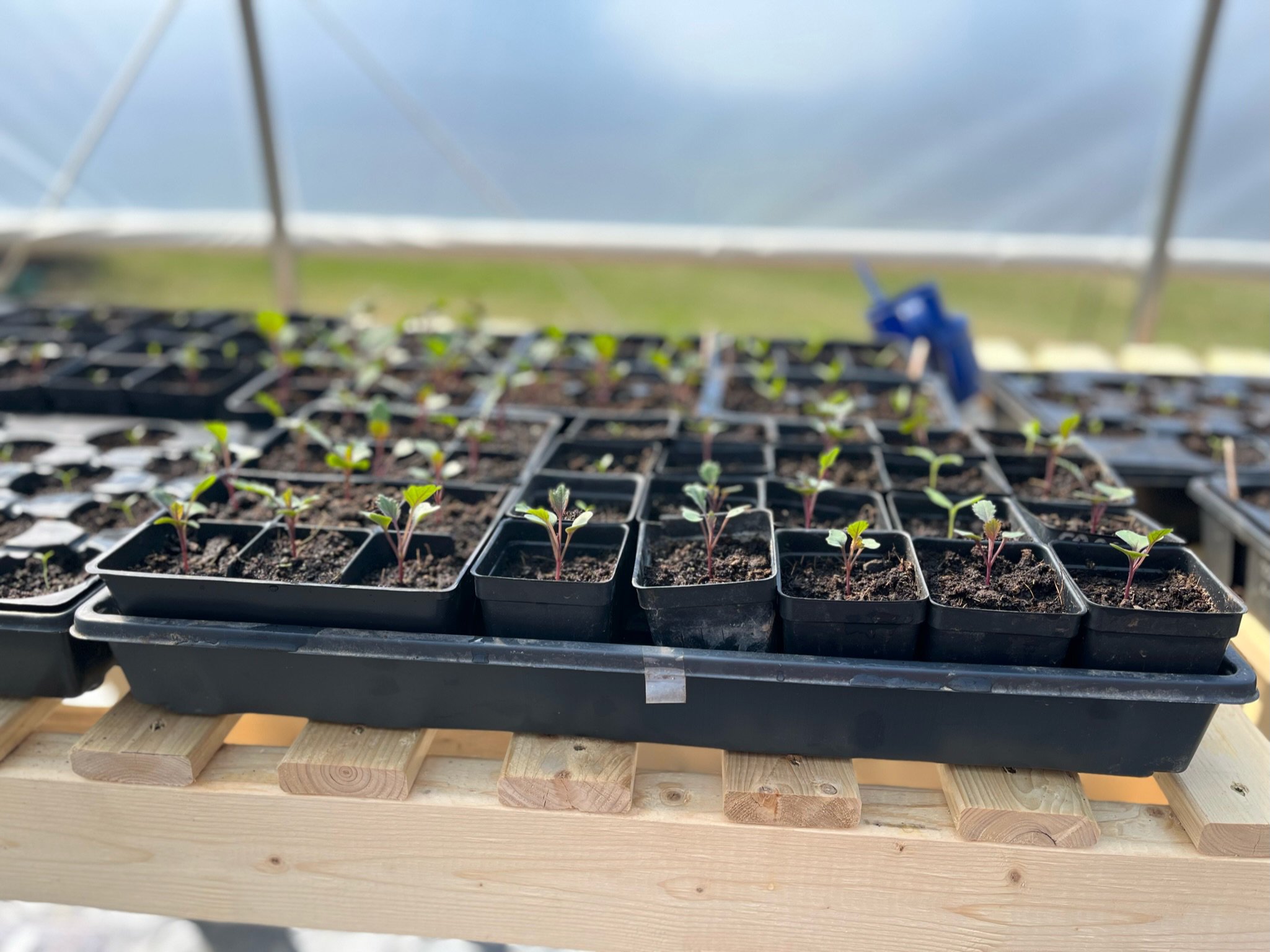The Place
Birth of Frog Song Farm
Barely in its first season of production, Frog Song Farm has sprung to life on a southwestern exposed hill, once dominated by a chaotic ensemble of brush, weeds, and buckthorn. Over the last four years, we've orchestrated a transformation, gradually replacing the discordant jumble with harmonious cover crops each summer and fall, relying on the help and wisdom of local experts who have each contributed to the farm’s creation..
Over time, the field will continue to shift its melody, its buckwheat or rye cover transitioning into verdant beds of vegetables and flowers. On the sidelines, hedgerows will burst with life, serving as sanctuaries for birds, insects, and other animal partners.
The Serenade of the Pond
Center stage in this tableau is the pond. A magnetic feature, it caught our hearts upon our arrival in Charlotte, despite the dissonance of a clogged pipe and invasive grass species. But the real attraction was the chorus of frogs - in all stages of life - their presence a song we were immediately drawn to.

In the Spring of 2021, we composed a new beginning for the pond. We cleared the obstruction, removed the invasive species, and repaired the erosion. As we peered into the 10-foot hollow, we wondered how swiftly nature would reclaim its stage. Our answer came in the form of eager frogs, returning to their home, transforming from inch-long tadpoles to 4-inch marvels, from small, nimble performers to large, vocal maestros serenading us throughout the day - and often into the night.
Thus, the only fitting name for this land was "Frog Song Farm". From May to August, the prime months of gardening, the air is filled with their music, their garumphs and croaks echoing across the pond and reaching out into the woods for their tree frog kin.
A Symphony of Praise
The term "croaking" is seldom associated with beauty. Yet, there is a tale of Rabbi Dov Ber, a founder of the Hasidic movement in Judaism, who found divine praise in the "horrid sound" of the croaking frogs. As the story goes, Rabbi Dov Ber would rise early, absorbing the dawn mists by the lakes near his home, entranced by the chorus of the frogs.
His students couldn't comprehend what their teacher was listening for until one discerning pupil understood: all of creation, from the cosmos to the oceans, the mountains, the trees, and indeed, even the frogs, praises the Divine in their unique voices.
As we’ve cultivated the gardens and played with our children in the fields and woods, we've learned to listen to this symphony of life. To hear the praise and beauty in the frog songs, to see the sanctity in the soil, the water, and the seeds. And we invite you to join us, to experience the harmony, the rhythm, and the melody of this special place.

The Farm
The Power of Gleaning
The tradition of gleaning can be traced back to ancient times and holds a special place within Jewish biblical law. As described in the books of Leviticus and Deuteronomy, farmers were instructed not to pick their fields clean, but instead, to leave the edges and any fallen produce for the poor and the stranger. This practice, known as gleaning, reflects a profound commitment to community support and social justice.
Today at Frog Song Farm, we embrace this age-old ethos. As a non-profit gleaning farm, we are not merely cultivators of the earth, but caretakers of our community. Our mission is to grow nutritious, fresh produce, which we then donate to our neighbors in need. We believe that the bounty of the earth should nourish all, especially those most vulnerable.
Gleaning, for us, is more than a farming practice; it's a philosophy. It's about reducing waste, promoting food security, and nurturing a healthier, stronger community. Inspired by our Jewish heritage, we see gleaning as a way to share the earth's abundance, creating a world where everyone has access to the nourishment they need.
Regenerative Practices
On our farm, the soil is more than just dirt; it's a living, breathing ecosystem. We believe in farming practices that not only respect this ecosystem, but also aim to enhance and regenerate it.
We adhere to organic and minimal till practices, which means we avoid synthetic pesticides and fertilizers, and we disturb the soil as little as possible. This helps to preserve the soil structure, retain moisture, and maintain a healthy population of beneficial soil organisms.
An Ecological Approach
But caring for the soil is just one part of the story. At Frog Song Farm, we also recognize the importance of the larger ecological picture.
We've set aside spaces for hedgerows, which serve as habitats for birds and pollinators, and we work hard to maintain a balance between our farming activities and the needs of these creatures. We understand that our farm is part of a larger ecosystem, and we strive to nurture all its inhabitants.
In addition, we also see ourselves as part of a community. Our neighbors, who pass our farm and share in its beauty and bounty, are just as much a part of this ecosystem as the birds and the bees. We believe that by taking an ecological approach to farming, we're not just growing food; we're also growing connections, creating a sense of belonging, and fostering a community that cares for the earth and for each other.